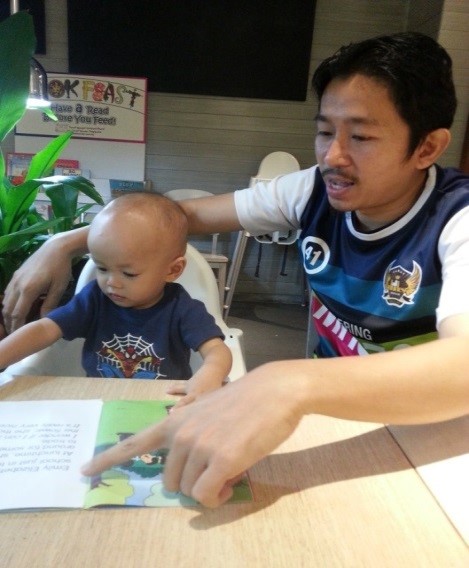Speech-language therapists are professional who are responsible for providing clinical services for speech, language, communication and swallowing problems.
Below are examples of speech, language, communication and swallowing problems:
- Speech problem
- Pronunciation problem
- Apraxia
- Dysarthria
- Resonance problem
- Voice problem
- Stuttering
- Language problem
- Speech delay
- Improper sentence structure
- Difficult to understand conversation
- Difficult to follow simple / complex command
- Swallowing Problem
- Difficult to swallow food /drink
- Cough during eating /drinking
- Take longer time to finish meal
- Feel food stuck in throat after eating/drinking

Source : Writer’s collection
A person with speech, language, communication, and/or swallowing problem should be referred to a qualified Speech-Language Therapist to treat the problem. The Speech-Language Therapist will either do screening, assessment, provide treatment and/or counseling to manage the problem.
Speech, language, communication, and swallowing difficulties could happen to anybody at any age level. Commonly, children with Down Syndrome, Cerebral Palsy, learning difficulty, hearing impaired, cleft lip/palate, and Autism Spectrum Disorder will have speech, language, and/or communication problem. Adults also could acquire speech, language, communication and/or swallowing problems due to stroke, brain injury, and aging process. The need of speech therapy session is different from each person depending on potential and motivation of patient and family towards the therapy program.
Additionally, Speech-Language Therapists are also involved in activities such as :
- Educating the public about speech, language, communication and swallowing problems through campaigns, talks, and brochures
- Conduct research related to speech, language, communication and swallowing difficulty
- Develop policies, procedures, and standards of speech therapy services
Qualification
Bachelor of Speech Science @ Bachelor of Health Science (Speech Pathology) from local and foreign universities are recognized.
Working Placement
Career as a Speech-Language Therapist is a profession that is constantly evolving over time. The advantages of this profession is that it allows Speech-Language Therapists to work in various sectors including:
- Public and private hospitals
- Public and private clinics
- Early rehabilitation centers; Pemulihan Dalam Komuniti (PDK), early intervention center (EIP)
- Public and private special education schools
- University & university hospitals
- Public and private rehabilitation centers
- House calls
- Nursing homes
Challenges
Although a career as a Speech-Language Therapist has seen extensive work opportunities, but there are some constraints in the scope of services in Malaysia. Among the challenges are:
-
Lack of graduates in the field of speech-language therapy
So far only two public universities offer courses in the field of speech-language therapy for degree level. The number of new students for a university is very low, about 15-20 students in the past year. This is due to the lack of lecturers and facilities for clinical training.
-
Lack of Speech-Language Therapist working with Ministry of Health
Although speech therapy services have been introduced in the Ministry of Health since 2001, the shortage of Speech-Language Therapist in the Ministry of Health is still a major issue. In 2014 the ratio of Speech-Language Therapist to Malaysian population is 1: 156,760.
As of September 2015, there are only 104 Speech-Language Therapists serving in the Ministry of Health. New intake of Speech-Language Therapists in the Ministry of Health in the past 10 years (2001 to 2010) was about 6 people a year. Patients have to wait for longer time to see a Speech-Language Therapist due to shortage of Speech-Language Therapist in Ministry of Health. One of the reasons why only a limited number of Speech-Language Therapists are interested to join Ministry of Health is because they can earn more in the private sector or abroad.
References
- American Speech-Language-Hearing Association. 2007. Scope of Practice in Speech-Language Pathologist [Scope of Practice]. Available from www.asha.org/policy.doi: 10.1044/policy.SP2007-00283
- Laporan Pembentangan Pengiraan Unjuran Keperluan Profesion Terapis Pertuturan-Bahasa bagi tahun 2010 di sesi Pembentangan Aktiviti Makmal Perancangan Tenaga Manusia
- American Speech-Language-Hearing Association. 2002. Knowledge and skills needed by speech-language pathologists providing services to individuals with swallowing and/or feeding disorders [Knowledge and Skills]. Available from www.asha.org/policy. [2 Disember 2014]
- American Speech-Language-Hearing Association. 2001. Swallowing Disorders (Dysphagia) in Adults. http://www.asha.org/public/speech/swallowing/Swallowing-Disorders-in-Adults/ [2 Disember 2014]
- Ashley J. Duggan M. & Sutcliffe N. 2006. Speech, Language, and Swallowing in the Older Adult. Clinics in Geriatric Medicine. Vol. 22 (2): 291-310.
| Last Reviewed | : | 28 August 2020 |
| Writer / Translator | : | Ropidah bt. Razali |
| Accreditor | : | Amelia Inbam Neelagandan |
| Reviewer | : | Nadwah bt. Onwi |







